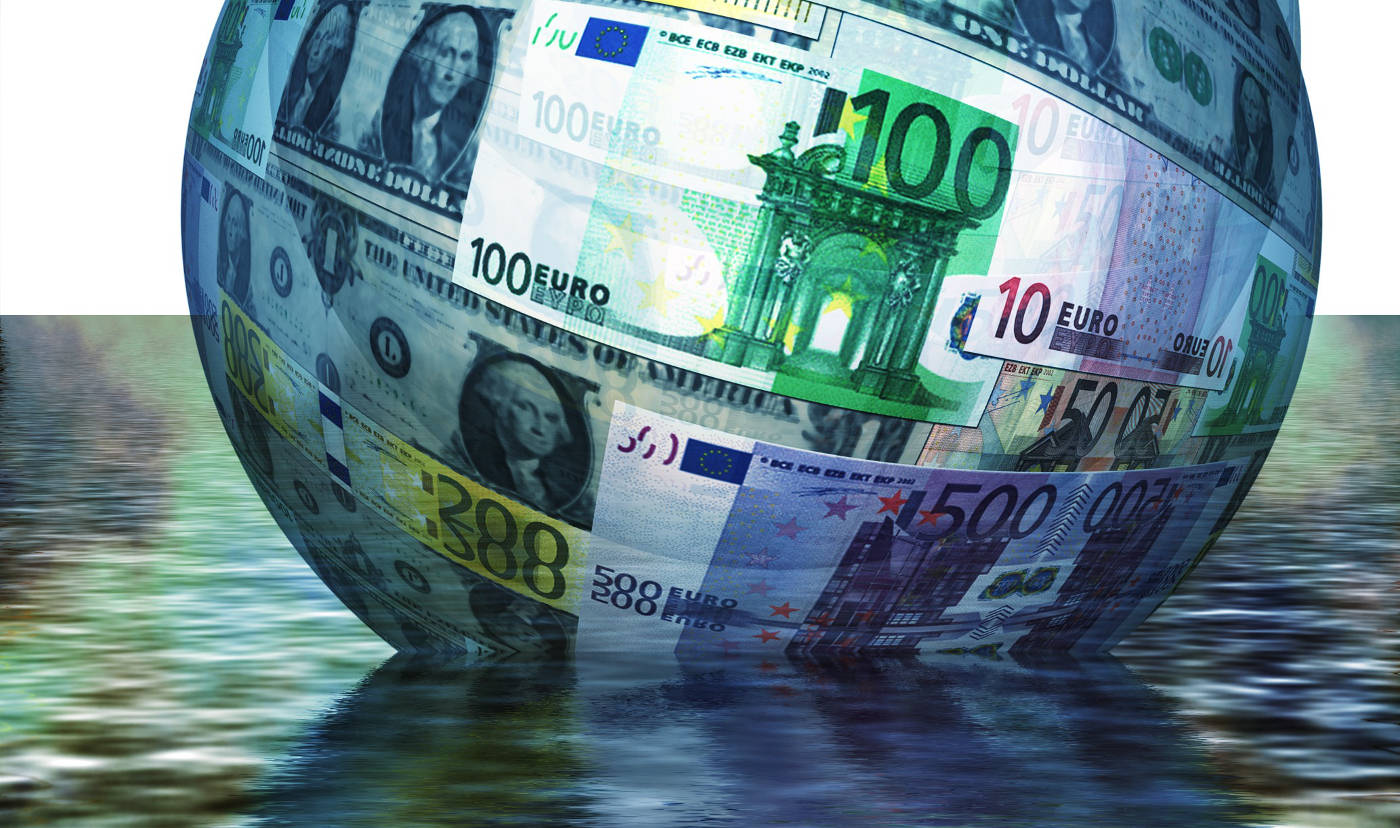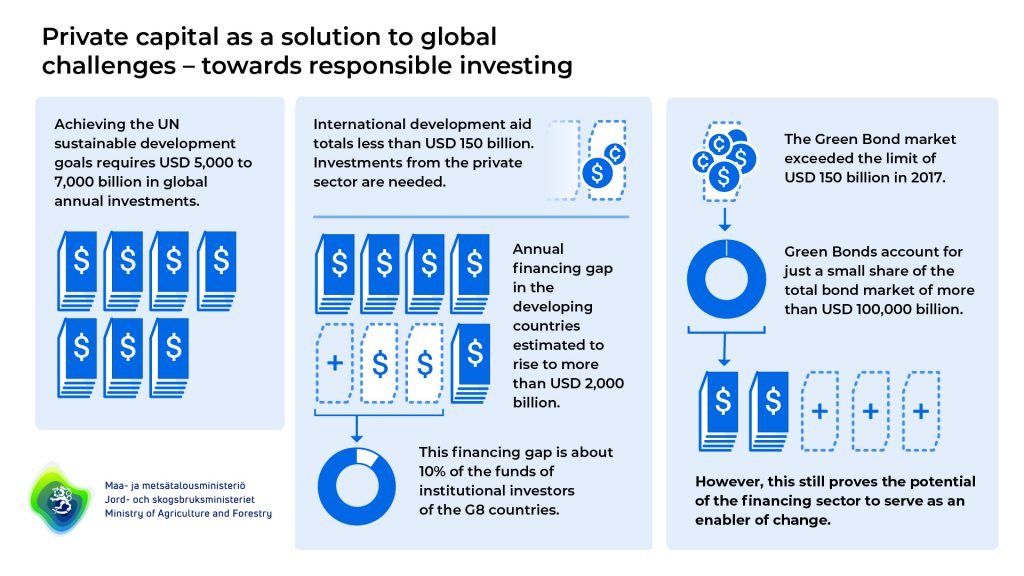Private capital – solution to global challenges?
Blog - Published 7.1.2019



 Based on international assessments, achieving the Sustainable Development Goals (SDGs) will require USD 5,000 to 7,000 billion in global annual investments. In the developing countries alone the annual financing gap is estimated at more than USD 2,000 billion. With the traditional development aid of less than USD 150 billion a year, it is obvious that solving the challenges will require significant investments from the private sector.
Based on international assessments, achieving the Sustainable Development Goals (SDGs) will require USD 5,000 to 7,000 billion in global annual investments. In the developing countries alone the annual financing gap is estimated at more than USD 2,000 billion. With the traditional development aid of less than USD 150 billion a year, it is obvious that solving the challenges will require significant investments from the private sector.
The financing challenge is also a national one, and even greater in view of the expected decline in the leeway of public economies. In future Finland should apply public measures and investments to boost sustainable and responsible investments in the private sector so that these together will enable to achieve the national and international targets set for sustainable development, nature protection and e.g. the bioeconomy and circular economy.
Financial sector waking up to SDG investments
The financing gap may seem like a massive one, but actually it corresponds to just a small, about 10% share of the funds of institutional investors in the G8 countries. Responsible investing is evolving and diversifying fast. Green Bonds, i.e. investments earmarked to achieve sustainable development or climate objectives, represent a rapidly-growing market where the Nordic players have been among the international leaders. In 2017 the Green Bonds market already exceeded USD 150 billion, which was thus also higher than the annual amount paid in development aid.
Even if Green Bonds are still just a drop in the ocean of the global bond market worth more than USD 100,000 billion, they still serve as proof of the potential of the financial sector in enabling change. The growing commitment of operators in the financial sector to the UN principles for ESG investing (Environmental, Social and Governance) also reflects the trend that has gained momentum in recent years. In 2015 the stakeholders committed to the UN principles for socially responsible investing managed assets worth USD 59,000 billion.
Impact investing, in turn, represents a completely new, rapidly-growing form of investment where the aim is to create social benefits and solve societal problems, as well as producing an economic return. Performance-based SIB agreements introduced by the Finnish Innovation Fund Sitra are currently tested in Finland where private investors finance the measures to reach a certain goal and the public sector only pays for the proven, measurable impact.
Several international studies support the view that both in the short and long term investments that are in line with the principles of sustainable development are the only ones that can be genuinely profitable and sustainable choices also for the investors.
What could Finland’s Sustainable Development Roadmap look like?
In 2018 the Ministry of Agriculture and Forestry used funding allocated to the Government key project on the blue bioeconomy to launch a study aimed at identifying operating models by which private Finnish capital could in future be better targeted to solving global development challenges. The roadmap to be designed may also boost the international business operations of responsible Finnish companies e.g. in the water sector.
Gaia Consulting is responsible for conducting the study, to be completed in March 2019. The work will be carried out as a participatory process, with the key ministries, Business Finland and representatives of civil society organisations and the financial sector involved in the steering and commenting.
Knowledge and best practices from around the world will be used while also assessing their applicability in Finland. At various stages of the process necessary partnerships and operating models are identified to remove the bottlenecks that now exist. The ambitious target is to launch a process that will lead to the evolvement of a sustainable financing ecosystem and creating feasible financing models that will bring different stakeholders together for the benefit of the Finnish society. This is not going to be easy but it is surely worth the effort!
So stay tuned. In future it may well be possible to use Blue Bonds or impact investing to finance and implement measures to restore the Baltic Sea or investments in water supply and sanitation both in Finland and in the developing countries.
Timo Halonen is responsible for the Finnish programme under the European Maritime and Fisheries Fund and the Government key project on the blue bioeconomy. He is also tasked with promoting the application of public procurement and the impact investment model to solve the challenges in the bioeconomy and circular economy. Contact: timo.halonen(a)mmm.fi
Seppo Rekolainen is responsible for the international water cooperation of the Ministry of Agriculture and Forestry, including cooperation with China and Russia and in international organisations, in particular in promoting transboundary water cooperation. Financing is also a key element in achieving the Sustainable Development Goal concerning clean water and sanitation (SDG6). Contact: seppo.rekolainen(a)mmm.fi
Mikko Halonen coordinates the work relating to the Sustainable Development Goals at Gaia Consulting. In his work a particular focus is on climate change mitigation and adaptation and the role of a responsible private sector and finances in the achievement of the objectives of the 2030 Agenda – in Finland and internationally. Contact: mikko.halonen(a)gaia.fi
Blue bioeconomy blog series in Bioeconomy.fi.
Published in Finnish December 5, 2018.

